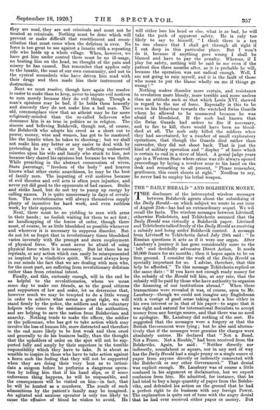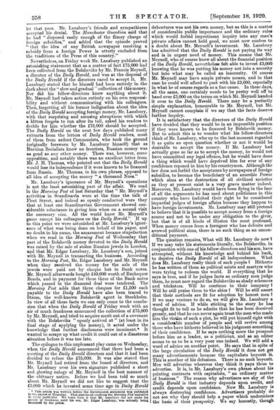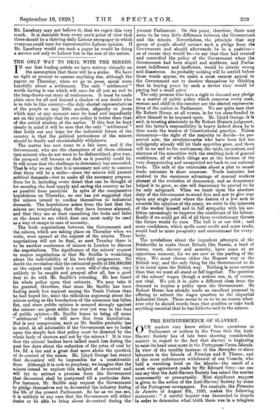THE " DAILY HERALD " AND BOLSHEVIK MONEY.
THE disclosure of the intercepted wireless messages between Bolshevik agents about the subsidizing of the Daily Herald—on which subject we wrote in our ism of August 21st—has had an extraordinary sequel. We wil recall the facts. The wireless messages between Litvinoff, otherwise Finkelstein, and Tchitcherin assumed that the Daily Herald was virtually a Bolshevik paper. Litvinofl and Tchitcherin talked freely of the Daily Herald as receiving a subsidy and being under Bolshevik control. A message from Litvinoff to Tchitcherin dated July 20th said : " In Russian questions it acts as if it were our organ. After Lansbury's journey it has gone considerably more to the ' left' and decidedly advocates Direct Action. It needs 50,000 francs for six months ; then it hopes again to be on firm ground. I consider the work of the Daily Herald as specially important for us. I advise, therefore, that this help be afforded." To this message Tchitcherin replied on the same date : " If you have not enough ready money for the subsidy of the Herald tell him, at any rate, that the subsidy will be paid by those who have authority to organize the financing of our institutions abroad." When these transactions were revealed it was, of course, open to Mr. Lansbury—though we could not imagine any Englishman with a vestige of good sense taking such a line either in his own interest or in that of his paper—to argue that it was right and natural for international Socialists to accept money from any foreign source, and that there was no need to apologize. Mr. Lansbury did nothing of the sort. He suggested that the messages were a forgery or that the British Government were lying ; but he also said alterna- tively that if the messages were genuine the charges were absolutely untrue. He declared that " Not a Bond. Not a Franc. Not a Rouble," had been received from the Bolsheviks. Again, he said: " Neither directly nor indirectly, roundabout or square, nor in any sort of way has the Daily Herald had a single penny or a single ounce of paper from anyone directly or indirectly connected with the Bolshevik or any other Government." That denial was explicit enough. Mr. Lansbury was of course a little confused in his argument or declamation, but we expect confusion from him. He admitted, for instance, that he had tried to buy a large quantity of paper from the Bolshe- viks, and defended his action on the ground that he had a perfect right to do business with any foreign Power. The explanation is quite out of tune with the angry denial that he had ever received either paper or money. But let that pass. Mr. Lansbury's friends and sympathizers accepted his denial. The Manchester Guardian said that he had " disposed easily enough of the flimsy charge of foreign subsidies," and added that the episode proved " that the idea of any British newspaper receiving a subsidy from a foreign Power is utterly excluded from the traditions of the Press of this country."
Nevertheless, on Friday week Mr. Lansbury published an astonishing statement that as a matter of fact £75,000 had theen collected from the Bolsheviks by Mr. Francis Meynell, a director of the Daily Herald, and was at the disposal of the Daily Herald if the directors cared to accept it. Mr. Lansbury stated that he himself had been entirely in the dark about the " slow and gradual " collection of this money. ior did his fellow-directors know anything about it. Mr. Meynell had taken action entirely on his own responsi- bility and without communicating with his colleagues. Then, forgetting all his former indignation about the idea of the Daily Herald accepting foreign money, Mr. Lansbury, with that surprising and amusing abruptness with which a kitten forgets to run after its tail, asked his readers to decide for him whether the £75,000 should be accepted. The Daily Herald on the next few days published many extracts from the letters of Daily Herald readers, most of them from ardent Communists, who took the ground (originally forsworn by Mr. Lansbury himself) that as Marxian Socialists know no frontiers, Russian money was as good as any other money. There was, however, some opposition, and notably there was an excellent letter from Mr. J. H. Thomas, who pointed out that the Daily Herald would lose its independence if it were known to be financed from Russia. Mr. Thomas, in his own phrase, opposed to all idea of accepting the money " a thousand Noes."
Mr. Lansbury's ignorance of Mr. Meynell's operations is not the least astonishing part of the affair. We read in the Morning Post of last Saturday that " Mr. Meynell's activities in Scandinavia were at the time the talk of Fleet Street, and indeed so openly conducted were they that at least one Scandinavian Government showed con- siderable reluctance in giving him when on a second visit the necessary visa. All the world knew Mr. Meynell's game except his colleagues on the Daily Herald." If up to this point we were astonished at Mr. Lansbury's ignor- ance of what was being done on behalf of his paper, and no doubt in his name, the amazement became stupefaction when we read in the Morning Post of Wednesday that part of the Bolshevik money devoted to the Daily Herald was raised by the sale of stolen Russian jewels in London, and that Mr. Edgar Lansbury, Mr. Lansbury's son, joined with Mr. Meynell in transacting the business. According to the Morning Post, Mr. Edgar Lansbury and Mr. Meynell when they received the money for the sale of the jewels were paid not by cheque but in Bank notes. Mr. Meynell afterwards bought £40,000 worth of Exchequer Bonds, and in payment for these three of the Bank notes which passed in the diamond deal were tendered. The Morning Post adds that three cheques for £1,500 each payable to the Daily Herald have also been traced to Strom, the well-known Bolshevik agent in Stockholm. In view of all these facts we can only come to the conclu- sion that when the Daily Herald of Friday week with an air of much frankness announced the collection of £75,000 by Mr. Meynell, and tried to acquire merit out of a covenant with the Bolsheviks " openly arrived at " (at least in its final stage of applying the money), it acted under the knowledge that further disclosures were imminent.* It wanted to scrape up what credit it could out of a disastrous situation before it was too late.
The epilogue to this unpleasant play came on Wednesday, when the Daily Herald announced that there had been a meeting of the Daily Herald directors and that it had been decided to refuse the £75,000. It was also stated that Mr. Meynell had retired from the board of directors, and Mr. Lansbury over his own signature published a short and glowing eulogy of Mr. Meynell in the best manner of the obituary notice. Before we had been told so much about Mr. Meynell we did not like to suggest that the £3,000 which he invested some time ago in Daily Herald • This article was written before the Government statement was published in the papers of Thursday. That statement confirms the Morning Pod narrative in every particular. We learn from it that Mr. Lansbury did not make his parade of frankness until his son. Mr. Edgar Lansbury. was actually being asamined by the police. debentures was not his own money, but as this is a matter of considerable public importance and the ordinary rules which would forbid impertinent inquiry into any man's private affairs cannot hold good, we must now confess to a doubt about Mr. Meynell's investment. Mr. Lansbury has admitted that the Daily Herald is not paying its way and is in urgent need of money. This means that Mr. Meynell, who of course knew all about the financial position of the Daily Herald, nevertheless felt able to invest £3,000 knowing that he was putting his money not into a security but into what may be called an insecurity. Of course Mr. Meynell may have ample private means, and in that case he could well afford to part with his E3,000, especially in what he of course regards as a fine cause. In these days, all the same, one certainly needs to be pretty well off to hand over £3,000 on the terms on which Mr. Meynell handed it over to the Daily Herald. There may be a perfectly simple explanation, honourable to Mr. Meynell, but Mr. Meynell cannot complain if we say that the facts deserve further inciuiry. It is satisfactory that the directors of the Daily Herald have decided that they would be in an impossible position if they were known to be financed by Bolshevik money. But to admit this is to wonder what his fellow-directors think of Mr. Lansbury, who up to the last moment regarded it as quite an open question whether or not it would be desirable to accept the money. If Mr. Lansbury had actually gone so far as to accept the money, he would not have committed any legal offence, but he would have done a thing which would have deprived him for ever of any confidence reposed in him by his countrymen. Although the law does not forbid the acceptance by newspapers of foreign subsidies, to become the beneficiary of an anarchic Power which aims at the destruction of all civilized societies as they at present exist is a very grave matter indeed. Moreover, Mr. Lansbury would have been flying in the face of all the arguments he has used about politicians in this country who have forfeited their right to be considered impartial judges of foreign affairs because they happen to have foreign investments. Mr. Lansbury may still pretend to believe that it is possible to accept money from a foreign source and not to be under any obligation to the giver, but that is of all kinds of illusion the most profound. When money comes from a foreigner who has definite and avowed political aims, there is no such thing as an uncon- ditional payment. The question remains, What will Mr. Lansbury do now If we may take his statements literally, the Bolsheviks, in conjunction with one of his fellow-directors and his son, have attempted, without his knowledge and behind his back, to deprive the Daily Herald of all independence. What does Mr. Lansbury really think of such people I Hitherto ho has written of them as political saints and martyrs who were trying to redeem the world. If everything that he says is true, and if he judges facts as ordinary men judge them, he must now regard the Bolsheviks as shady schemers and tricksters. Will he continue in their company I Will he still praise them to the skies ? Will he still assert that their methods are fit for adoption by honest men I If we may venture to do so, we will give Mr. Lansbury a word of advice. If while sticking to the story he has thought fit to tell us he admits that he has been deceived grossly, and that he can never again trust the men who made him the victim of such a plot, he will put himself right with a considerable number of people and will revive among those who have hitherto believed in his judgment something of their confidence. If he says nothing more the prospect before him as a leader, as a politician, and as an editor seems to us to be a very poor one indeed. We will add a word of advice on another point. He says that in spite of the large circulation of the Daily Herald it does not get many advertisements because the capitalists boycott it. This is another of his delusions. There is no such boycott. Men will advertise wherever they think it pays them to advertise. It is, in Mr. Lansbury's own phrase about his printing contracts with capitalists, " an ordinary matter of business." The reason why advertisers are shy of the Daily Herald is that industry depends upon credit, and credit depends upon confidence. Now Mr. Lansbury is always destroying confidence. Advertisers probably do not see why they should help a paper which undermines the basis of their prosperity. We say honestly, though Mr. Lanabury may not believe it, that we regret this very much. It is desirable from every one's point of view that there should be a thriving daily Labour newspaper to which everyone could turn for representative Labour opinion. If Mr. Lansbury would run such a paper he would be doing a service not only to Labour but to the rest of the nation.








































 Previous page
Previous page